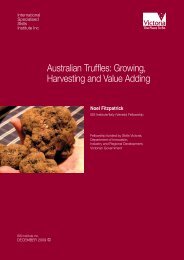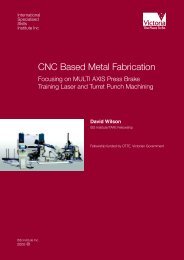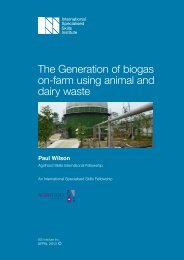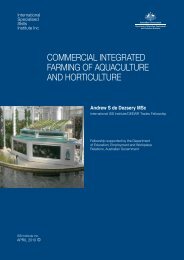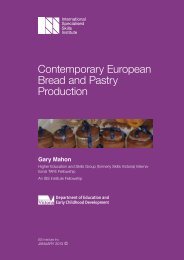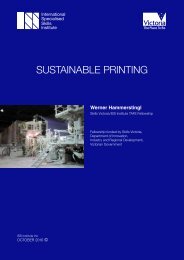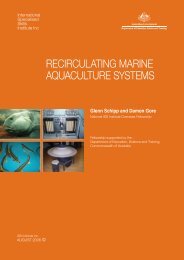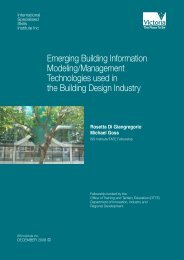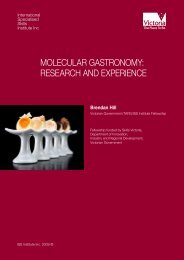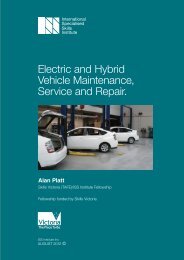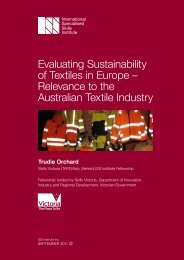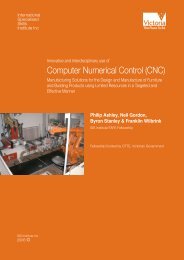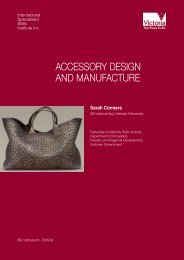Indonesian Conservation Management Practices & the Australian ...
Indonesian Conservation Management Practices & the Australian ...
Indonesian Conservation Management Practices & the Australian ...
- No tags were found...
Create successful ePaper yourself
Turn your PDF publications into a flip-book with our unique Google optimized e-Paper software.
International Context19when necessary and also be confident in how you deliver directions. This helps staff takedirection more clearly and encourages <strong>the</strong> project to always think quickly and concisely.Program <strong>Management</strong> Skills Identified• Organisational skills – This was <strong>the</strong> most valuable skill identified in <strong>the</strong> overall dailymanagement of <strong>the</strong> centre. The ability to multi-task, delegate work duties, manageanimal activity and daily planning is essential for smooth operations.• Strategic development, evaluation and assessment.• Business <strong>Management</strong>.• Preparation and submission of fundraising proposals and general report writing.• Communication – This was essential to all staff that worked at <strong>the</strong> project. Dailycommunication from <strong>the</strong> communications team ensured staff working on ground wereprepared for any activities that were out of <strong>the</strong>ir daily routine, eg: animal movementsand animal rescues.• Media and public relations, and interpersonal relations.• Liaison skills and stakeholder management.• Animal management and husbandry skills.• Conflict management.Key Findings/Outcomes• Nyaru Menteng employs over 140 local staff and its annual operating cost isapproximately US $2,000,000. 1 The rehabilitation project requires participation at alllevels, from village communities to <strong>the</strong> forestry department and local government.• The ‘no’ visitor approach ensures that disease transmission is minimal and that <strong>the</strong>animals do not become ‘habituated’ to people. This greatly assists rehabilitation of <strong>the</strong>animals to become wild.• Scientific knowledge is less important than organisational and communication skills,which are essential for overall management success.• Lack of government support for <strong>the</strong> project is evident. However, <strong>the</strong>re is no strategy fromNyaru Menteng that encourages support and direction from <strong>the</strong> local government.• Human Animal Conflict (HAC) is <strong>the</strong> number one issue that affects <strong>the</strong> centre andorangutans. 2 Building strong relations with <strong>the</strong> palm oil companies to report HAC andproblematic animals is essential for successful animal rescues. A strategy to addressthis needs to be developed and implemented as a high priority.• Habitat protection is required for timely release of <strong>the</strong> animals at <strong>the</strong> centre. This is timeconsuming to organise and requires support from o<strong>the</strong>r environmental organisations,local and national government bodies, Forestry Department and local communities.Nyaru Menteng has recently released 120 animals into a forested region with supportat all levels, but several years were needed to complete <strong>the</strong> habitat assessments andrequirements for release. This process needs to be efficient and land managementallocation needs full attention.• Developing and maintaining relationships has proven to be very important. NyaruMenteng works closely with large companies like BHP Indonesia. This has been an1 Meeting with Ms. Lone Droscher Nielsen, 2/02/07, Project Manager, Nyaru Menteng Orangutan Rescue andRehabilitation Centre.2 Meeting with Mr. Hardi Bakatori, 20/01/07, Vice Manager, Nyaru Menteng Orangutan Rescue and RehabilitationCentre.



